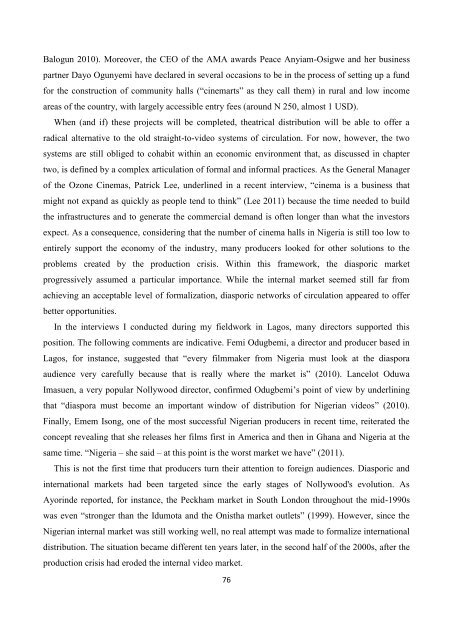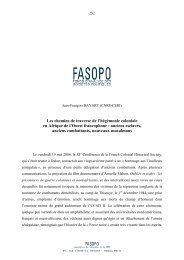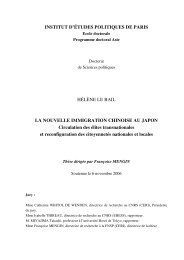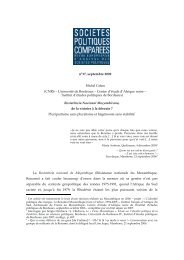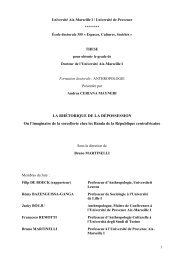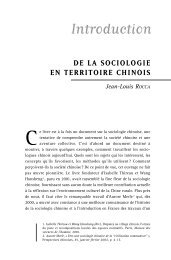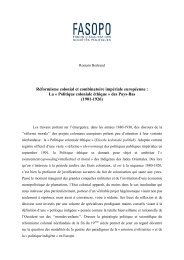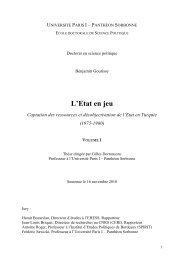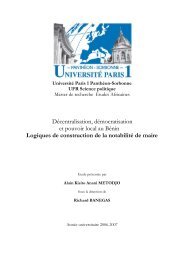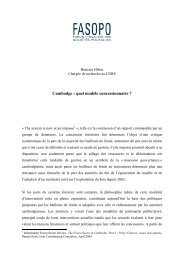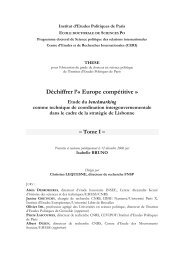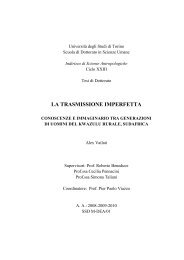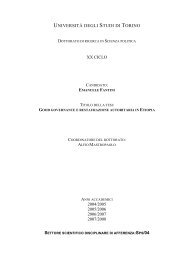You also want an ePaper? Increase the reach of your titles
YUMPU automatically turns print PDFs into web optimized ePapers that Google loves.
Balogun 2010). Moreover, the CEO of the AMA awards Peace Anyiam-Osigwe and her businesspartner Dayo Ogunyemi have declared in several occasions to be in the process of setting up a fundfor the construction of community halls (“cinemarts” as they call them) in rural and low incomeareas of the country, with largely accessible entry fees (around N 250, almost 1 USD).When (and if) these projects will be completed, theatrical distribution will be able to offer aradical alternative to the old straight-to-video systems of circulation. For now, however, the twosystems are still obliged to cohabit within an economic environment that, as discussed in chaptertwo, is defined by a complex articulation of formal and informal practices. As the General Managerof the Ozone Cinemas, Patrick Lee, underlined in a recent interview, “cinema is a business thatmight not expand as quickly as people tend to think” (Lee 2011) because the time needed to buildthe infrastructures and to generate the commercial demand is often longer than what the investorsexpect. As a consequence, considering that the number of cinema halls in Nigeria is still too low toentirely support the economy of the industry, many producers looked for other solutions to theproblems created by the production crisis. Within this framework, the diasporic marketprogressively assumed a particular importance. While the internal market seemed still far fromachieving an acceptable level of formalization, diasporic networks of circulation appeared to offerbetter opportunities.In the interviews I conducted during my fieldwork in Lagos, many directors supported thisposition. The following comments are indicative. Femi Odugbemi, a director and producer based inLagos, for instance, suggested that “every filmmaker from Nigeria must look at the diasporaaudience very carefully because that is really where the market is” (2010). Lancelot OduwaImasuen, a very popular Nollywood director, confirmed Odugbemi’s point of view by underliningthat “diaspora must become an important window of distribution for Nigerian videos” (2010).Finally, Emem Isong, one of the most successful Nigerian producers in recent time, reiterated theconcept revealing that she releases her films first in America and then in Ghana and Nigeria at thesame time. “Nigeria – she said – at this point is the worst market we have” (2011).This is not the first time that producers turn their attention to foreign audiences. Diasporic andinternational markets had been targeted since the early stages of Nollywood's evolution. AsAyorinde reported, for instance, the Peckham market in South London throughout the mid-1990swas even “stronger than the Idumota and the Onistha market outlets” (1999). However, since theNigerian internal market was still working well, no real attempt was made to formalize internationaldistribution. The situation became different ten years later, in the second half of the 2000s, after theproduction crisis had eroded the internal video market.76


